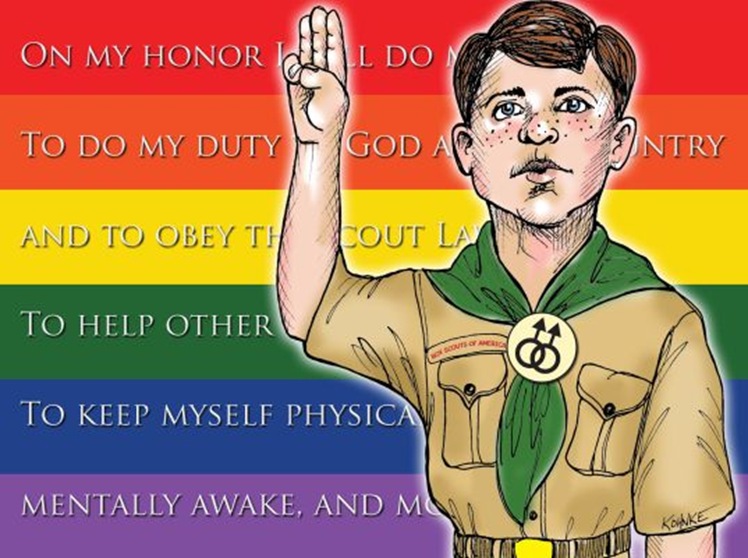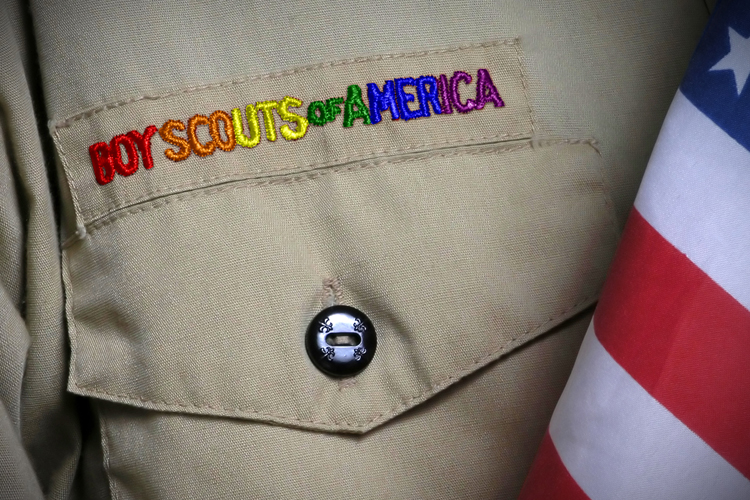Washington Times
December 31, 2013

The Boy Scouts of America will accept openly gay youths starting on New Year’s Day, a historic change that has prompted the BSA to ponder a host of potential complications — ranging from policies on tentmates and showers to whether Scouts can march in gay pride parades.
Yet despite their be-prepared approach, BSA leaders are rooting for the change to be a non-event, comparable to another New Year’s Day in 2000 when widespread fears of digital-clock chaos to start the new millennium proved unfounded.
“My hope is there will be the same effect this Jan. 1 as the Y2K scare,” said Brad Haddock, a BSA national executive board member who chairs the policy implementation committee. “It’s business as usual, nothing happens and we move forward.”
Some churches are dropping their sponsorship of Scout units because of the new policy and some families are switching to a new conservative alternative called Trail Life USA. But massive defections haven’t materialized and most major sponsors, including the Roman Catholic and Mormon churches, are maintaining ties.
“There hasn’t been a whole lot of fallout,” said Haddock, a lawyer from Wichita, Kan. “If a church said they wouldn’t work with us, we’d have a church right down the street say, ‘We’ll take the troop.’”
The new policy was approved in May, with support from 60 percent of the 1,400 voting members of the BSA’s National Council. The vote followed bitter nationwide debate, and was accompanied by an announcement that the BSA would continue to exclude openly gay adults from leadership positions.
Under the new membership policy, youths can no longer be barred from the Cub Scouts, Boy Scouts or coed Venturers program solely on the basis of sexual orientation. However, gay Scouts will face some limitations.
“Any sexual conduct, whether heterosexual or homosexual, by youth of Scouting age is contrary to the virtues of Scouting,” says one BSA document. “No member may use Scouting to promote or advance any social or political position or agenda, including on the matter of sexual orientation.”
Trying to anticipate potential friction, the BSA has distributed extensive explanations and question-and-answer documents related to the policy.
Some examples:
—Could a Scout march in uniform in a gay-pride parade? No, says the BSA. “Each youth member is free as an individual to express his or her thoughts or take action on political or social issues but must not use Scouting’s official uniforms and insignia when doing so.”
—How publicly active could a gay Scout be, in terms of gay-rights advocacy? The BSA’s reply: “While a youth member may acknowledge his or her sexual preference, that acknowledgment may not reach the level of distraction, which may include advocacy, promotion, or the distribution of information of a sexual nature.”
A frequently-asked-questions document anticipates that some objections might surface from parents — or Scouts themselves — in cases where a unit includes an openly gay boy.
Regarding shower and toilet facilities, the BSA says it is encouraging units to provide greater individual privacy, including moving away from the tradition of group showers.
“The adult leaders have the discretion to arrange private showering times and locations,” the BSA says.
